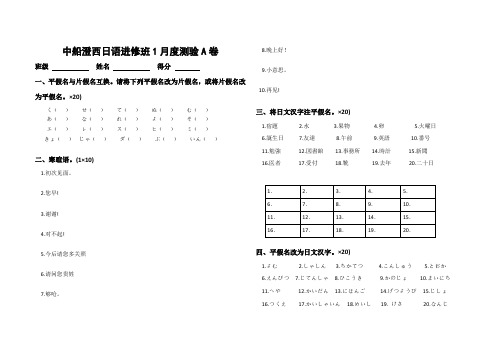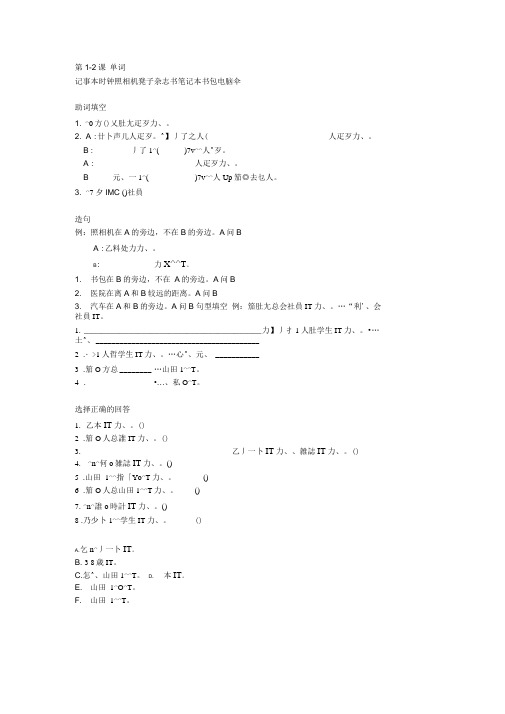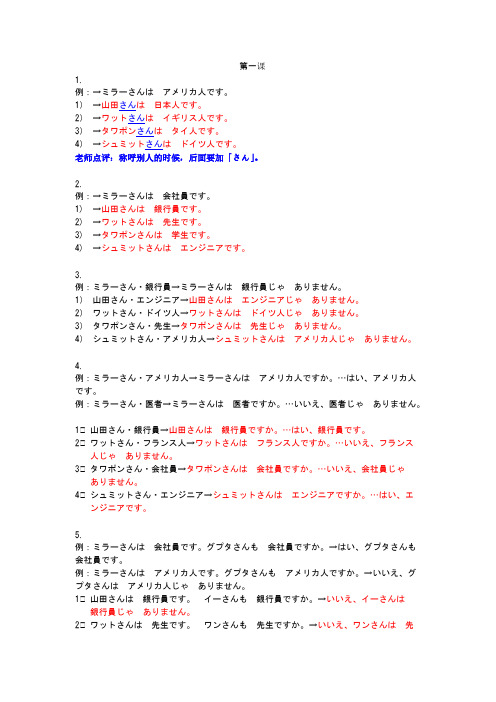《大家的日语》1-6课试题
- 格式:docx
- 大小:15.21 KB
- 文档页数:4

中船澄西日语进修班1月度测验A卷班级姓名得分一、平假名与片假名互换。
请将下列平假名改为片假名,或将片假名改为平假名。
×20)く﹙﹚せ﹙﹚て﹙﹚ぬ﹙﹚む﹙﹚あ﹙﹚な﹙﹚れ﹙﹚よ﹙﹚そ﹙﹚エ﹙﹚レ﹙﹚ス﹙﹚ヒ﹙﹚ミ﹙﹚きょ﹙﹚じゃ﹙﹚ダ﹙﹚ぷ﹙﹚いん﹙﹚二、寒暄语。
(1×10)1.初次见面。
2.您早!3.谢谢!4.对不起!5.今后请您多关照6.请问您贵姓7.够呛。
8.晚上好!9.小意思。
10.再见!三、将日文汉字注平假名。
×20)1.宿題2.水3.果物4.卵5.火曜日6.誕生日7.友達8.午前9.英語10.番号11.勉強12.図書館13.事務所14.時計15.新聞16.医者17.受付18.靴19.去年20.二十日四、平假名改为日文汉字。
×20)1.よむ2.しゃしん3.ちかてつ4.こんしゅう5.とおか6.えんぴつ7.じてんしゃ8.ひこうき9.かのじょ10.まいにち11.へや12.かいだん13.にほんご14.げつようび15.じしょ16.つくえ17.かいしゃいん18.めいし19. けさ20.なんじ五、中译日。
(1×10)1.我姓王,来自中国。
2.这支圆珠笔是老师的,不是你的。
3. 厕所在一楼呢还是在二楼呢4.那是山田的照相机。
5.你在公园吗6.到上海大概二小时左右。
7.午休是12点半到1点半。
8. 我每天早上7点去学校。
9.晚饭什么也没吃。
10.上周日干了什么六、日译中。
(1×10)鈴木さんはかいしゃいんですか。
----いいえ、そうじゃありません。
がくせいです。
2.こちらこそ、わたしは吉田です。
どうぞよろしく。
3.あのネクタイをみせてください。
4.おくにはどちらですか。
5.わたしはあさうちでしんぶんをよみます。
6.いつがっこうへきますか。
7.じゅぎょうはごごよじまでです。
8.なにでちゅうごくへかえりましたか。
9.いっしょににほんへいきませんか。
10.きのうパーティーをしませんでした。

第1-2课单词记事本时钟照相机凳子杂志书笔记本书包电脑伞助词填空1. ^0方()乂肚尢疋歹力、。
2. A :廿卜声儿人疋歹。
^】丿了之人( 人疋歹力、。
B : 丿了1^( )7v^^人^歹。
A : 人疋歹力、。
B 元、一1^( )7v^^人Up笳◎去乜人。
3. ^7 夕IMC ()社員造句例:照相机在A的旁边,不在B的旁边。
A问BA :乙料处力力、。
^^T。
B: 力X1. 书包在B的旁边,不在A的旁边。
A问B2. 医院在离A和B较远的距离。
A问B3. 汽车在A和B的旁边。
A问B 句型填空例:笳肚尢总会社員IT力、。
…“利'、会社員IT。
1.________________________________________ 力】丿扌1人肚学生IT力、。
•…土^、_________________________________________2.・>1人哲学生IT力、。
…心^、元、 ___________3.笳O方总________ …山田1^^T。
4. _________ •…、私O^T。
选择正确的回答1.乙本IT力、。
()2.笳O人总誰IT力、。
()3.乙丿一卜IT力、、雑誌IT力、。
()4.^n^何o雑誌IT力、。
()5.山田1^^指「Yo^T力、。
()6.笳O人总山田1^^T力、。
()7. ^n^誰o時計IT力、。
()8 .乃少卜1^^学生IT力、。
()A.乞n^丿一卜IT。
B. 3 8歳IT。
C.怎^、山田1^^T。
D.本IT。
E. 山田1^O^T。
F. 山田1^^T。
G. 、先生H. 自動車①雑誌^ToI.选择题例:本IT。
1.^n^{^n,何}①力^y^r^o-{^^L,^^Lo}^To2.{^o,^n}^何①亍一力、。
…日本語o^-y^To3.乙料总笳肚尢o力、老'^T力、。
…心^、元、{笳肚尢,初尢》}OCp笳◎去乜人。
4.^n^{新聞,何}^T力、。
•…比^、乞料总新聞^To5 .笳O人总{何,疋料}IT力、。

中船澄西日语进修班2月度测验A卷班级姓名得分一、平假名与片假名互换。
请将下列平假名改为片假名,或将片假名改为平假名。
(0.5×10)す﹙﹚め﹙﹚て﹙﹚ぬ﹙﹚む﹙﹚チ﹙﹚ボ﹙﹚プ﹙﹚エン﹙﹚ミョ﹙﹚二、寒暄语。
(1×10)1.我不客气了。
(饭前)2.你好吗?3.我该告辞了。
4.再来一杯怎么样?5.今后请您多关照6.我走了。
7.真遗憾啊。
8.您出门啊?9.您回来啦。
10.请稍等。
三、将下列日文汉字注上平假名。
(0.5×30)1.宿題2.研究3.習う4.旅行5.手伝う6.住所7.友達8.雨9.週末10.散歩11.手紙12.喫茶店13.事務所14.結婚15.生活16.忙しい17.受付18.妹19.海20.封筒21.辛い22.全部23.台所24.玄関25.左26.冷蔵庫27.女の子28.棚29.上手30.主人四、将下列平假名写出日文汉字。
(0.5×30)1.うる2.せんもん3.ちかてつ4.こんしゅう5.とおか6.よみかた7.じてんしゃ8.ひこうき9.あそぶ10.まいにち11.さびしい12.かいだん13.むかえる14.かわ15.およぐ16.かるい17.かんたん18.くうこう19. けさ20.しやくしょ21.くもり22.しけん23.きせつ24.きっぷ25.りょうしん26.ようじ27.こまかい28.りょう29.しんせつ30.にもつ五、写出下列片假名单词的中文意思。
(0.5×10)1.パスポート2.コピー3.プール4.ベランダ5.スイッチ6.プレゼント7.フィルム8.チケット9.スプーン10.フォーク六、中译日。
(1×10)1.在百货商店不准拍照。
2.请用日语写下名字和住所。
3.我想去海边游泳。
4.今年生日最想要什么样的生日礼物呢?5.上周的考试不太难。
6.昨天下雨,所以哪里也没去。
7.四月和五月哪个更暖和呢?8.去年圣诞节收到了什么样的礼物呢?9.我和小王一星期去一次超市。

《大家的日语1》第一课测试练习卷《大家的日语》第1課はじめましてテストI.単語(日中対訳)我<名> ________________________先生、女士、同志<接尾> ________________学生<名> ________________________公司职员<名> ________________________你,您<名> ________________________是、对<感> ________________________不、不是<感> ________________________银行职员<名> ________________________医生<名> ________________________ 他、她、那个人<名> ______________________哪位<名> ________________________大学<名> ________________________樱花大学<名> ________________________老师<名> ________________________代替<接尾> ________________________几岁<名> ________________________9<数> ________________________一岁<助数> ________________________美国<名> ________________________中国<名> ________________________~人<接尾> ________________________中国人<名> ________________________教师<名> ________________________他、她、那个人<名> ______________________谁<名> ________________________IMC公司<名> ________________________公司的职员<名> ________________________富士大学<名> ________________________巴西<名> ________________________8岁<助数> ________________________多大岁数<名> ________________________日本<名> ________________________英国<名> ________________________泰国<名> ________________________德国<名> ________________________亚洲研究中心<名> ______________________研究人员<名> ________________________神户<名> ________________________ 医院<名> ________________________神户医院<名> ________________________巴西航空<名> ________________________印度<名> ________________________韩国<名> ________________________印度尼西亚<名> ________________________动力电气公司<名> ______________________ ------------------------------------------------------------------------------------------- II. <練習C>初次见面。

第一课1.例:→ミラーさんは アメリカ人です。
1)→山田さんは 日本人です。
2)→ワットさんは イギリス人です。
3)→タワポンさんは タイ人です。
4)→シュミットさんは ドイツ人です。
老师点评:称呼别人的时候,后面要加「さん」。
2.例:→ミラーさんは 会社員です。
1)→山田さんは 銀行員です。
2)→ワットさんは 先生です。
3)→タワポンさんは 学生です。
4)→シュミットさんは エンジニアです。
3.例:ミラーさん・銀行員→ミラーさんは 銀行員じゃ ありません。
1)山田さん・エンジニア→山田さんは エンジニアじゃ ありません。
2)ワットさん・ドイツ人→ワットさんは ドイツ人じゃ ありません。
3)タワポンさん・先生→タワポンさんは 先生じゃ ありません。
4)シュミットさん・アメリカ人→シュミットさんは アメリカ人じゃ ありません。
4.例:ミラーさん・アメリカ人→ミラーさんは アメリカ人ですか。
…はい、アメリカ人です。
例:ミラーさん・医者→ミラーさんは 医者ですか。
…いいえ、医者じゃ ありません。
1、山田さん・銀行員→山田さんは 銀行員ですか。
…はい、銀行員です。
2、ワットさん・フランス人→ワットさんは フランス人ですか。
…いいえ、フランス人じゃ ありません。
3、タワポンさん・会社員→タワポンさんは 会社員ですか。
…いいえ、会社員じゃ ありません。
4、シュミットさん・エンジニア→シュミットさんは エンジニアですか。
…はい、エンジニアです。
5.例:ミラーさんは 会社員です。
グプタさんも 会社員ですか。
→はい、グプタさんも 会社員です。
例:ミラーさんは アメリカ人です。
グプタさんも アメリカ人ですか。
→いいえ、グプタさんは アメリカ人じゃ ありません。
1、山田さんは 銀行員です。
イーさんも 銀行員ですか。
→いいえ、イーさんは 銀行員じゃ ありません。
2、ワットさんは 先生です。
ワンさんも 先生ですか。
→いいえ、ワンさんは 先生じゃ ありません。

1,写出下列单词的当用汉字(10分)でんちほんやそとあいだのみものじょうずようじやくそくりょうしごとにもつきっぷくだものみずいまやすみとけいつくえざっしけんきゅうしゃ2,写出下列单词的假名(10分)病院医者韓国鉛筆自動車新聞手帳昼図書館銀行紅茶肉国庭所町食べ物便利山富士山3,写出下列单词的反义词。
(10分)静か寒い忙しい白い大きい親切難しい高い古い悪い4,填写助词。
(14分)①日本の生活()なれました。
②どこ()いきますか。
③私()えいが()すきです。
④どんなスポーツ()じょうずですか。
何()じょうずではありません。
⑤会社は5時()おわります。
⑥田中さんの家族は大阪()います。
⑦時間がありません()タクシー()いきましょう。
⑧中国じんははし()ごはんをたべます。
⑨鞄のなかにほん()かぎなどがあります。
⑩学校()ほんをもらいました。
⑪このとけいはどこ()かいましたか。
⑫私はタイ語()わかりません。
⑬東京のちかてつはきれいです。
()べんりです。
⑭桜はきれい()はなです。
5,翻译句子。
(40)①田中先生喜欢唱歌。
②你吃过午饭了吗。
③昨天因为太忙了所以哪里都没有去。
④她英语非常好。
⑤我们一起喝杯咖啡怎么样。
⑥我今天有事,所以要早点回去。
⑦学校食堂的东西又便宜有好吃。
⑧她虽然很飘亮但是太冷漠了,我不喜欢。
⑨北京的冬天很冷。
⑩东京是一个非常繁华的城市。
⑪インドネシアはあついくにですか。
⑫にほんのたべものはどうですか。
とてもおいしいです。
⑬どうしてきのうはやくかえりましたか。
つまのたんじょうびですから。
⑭いいシャツですね。
これですか、母にあげます。
⑮どうしてビールをのみませんか。
きらいですから。
6,阅读文章,回答问题。
(16)田中さんは35さいです。
IMCのしゃいんです。
しごとはげつようびからきんようびまでです。
ときどきどようびもしごとです。
かいしゃはいそがしいですから、ひまなじかんがあまりありませんが、かいしゃのひとはとてもしんせつですから、このしごとがすきです。
第1-2课单词记事本时钟照相机凳子杂志书笔记本书包电脑伞助词填空1.あの方()どなたてすか。
2.A:サントスさんはブラジル人です。
マリアさん()ブラジル人ですか。
B:はい、マリアさん()ブラジル人です。
A:ミラーさん()ブラジル人ですか。
B:いいえ、ミラーさん()ブラジル人じゃありません。
3.グブタさんはIMC()社員です。
造句例:照相机在A的旁边,不在B的旁边。
A问BA:これはカメラですか。
B:はい、それはカメラです。
1.书包在B的旁边,不在A的旁边。
A问B2.医院在离A和B较远的距离。
A问B3.汽车在A和B的旁边。
A问B句型填空例:あなたは会社員ですか。
…はい、会社員です。
1.カリナさんは学生ですか。
…はい、______2.ワンさんも学生ですか。
…いいえ、______3.あの方は_____…山田さんです。
4.これは_____…はい、私のです。
选择正确的回答1.これは本ですか。
()2.あの人は誰ですか。
()3.これはノートですか、雑誌ですか。
()4.それは何の雑誌ですか。
()5.山田さんはおいくつですか。
()6.あの人は山田さんですか。
()7.これは誰の時計ですか。
()8.ワットさんは学生ですか。
()A.それはノートです。
B.38歳です。
C.はい、山田さんです。
D.はい、それは本です。
E.山田さんのです。
F.山田さんです。
G.いいえ、先生です。
H.自動車の雑誌です。
I.はい、わたしのです。
选择题例:{この,これ}は本です。
1.それは{だれ,何}のカバンですか。
…{わたし,わたしの}です。
2.{その,それ}は何のテープですか。
…日本語のテープです。
3.これはあなたのかぎですか。
…いいえ、{あなた,わたし}のじゃありません。
4.これは{新聞,何}ですか。
…はい、それは新聞です。
5.あの人は{何,だれ}ですか。
…佐藤さんです。
6.太郎君は{だれ,何歳}ですか。
…8歳です。
读数字1.グプタさんは42歳です。
《大家的日语》1-6课日语试题一、下面句子中划线部分的单词,怎样读,从1、2、3中,选择最适合的一个填在()中。
(1×10=10分)1、わたしは駅で新聞を買います。
(1)、駅()1、へや 2、えき3、いえ(2)、買います()1、あいます 2、ういます3、かいます2、毎朝何を食べます。
(3)、毎朝()1、まいばん2、まいにち3、まいあさ(4)、何()1、なに2、なん3、どう(5)、食べます()1、よみます2、たべます3、みます3、けさ新聞を読みましたか。
(6)、新聞()1、しんぶん2、しぶん3、しぶん(7)、読みます()1、のみます2、ききます3、よみます4、わたしは家族と日本へ来ました。
(8)、家族()1、かそく2、かぞく3、かしく(9)、来ました()1、しました2、きました3、こました5、それは何の雑誌ですか。
(10)、雑誌()1、さっし2、ざつし3、ざっし6、わたしはワープロで手紙を書きます。
(11)、手紙()1、てがみ2、てかみ3、てかい7、もう新幹線の切符を買いました。
(12)、切符()1、きって2、きつぷ3、きっぷ8、きのう魚を食べました。
(13)、魚()1、さかな2、かなさ3、さしか9、誰と東京へ行きますか。
(14)、東京()1、ときょう2、とうきょう3、きょうとう10、これはヨーロパ旅行()のお土産です。
(15)旅行()1、りよこう2、りょうこ3、りょうこう二、下面句子中划线部分假名的汉字怎样写,从1、2、3中,选择最适合的一个填在()中。
(1×10=10分)1、李さんはかいしゃいんです。
(1)、かいしゃいん()1、銀行員2、研究者3、会社員2、わたしはあさ六時におきます。
(2)、あさ()1、晩2、朝3、昼(3)、おきます()1、寝ます2、起きます3、休みます3、これはじどうしゃの雑誌です。
(4)、じどうしゃ()1、自動車2、車3、自転車4、一緒にビールをのみませんか。
前六課总结练习1·这位是IMC公司的麦克·米勒先生。
2·米勒先生是IMC公司的职员,佐藤小姐也是IMC公司的职员。
3·那把伞是米勒先生的。
这把红色的是佐藤小姐的。
4·复印机在哪里?在二楼的办公室。
5·我将在1月5日和朋友去北海道滑雪。
6·上午9点至12点上班,中午在咖啡馆午休40分钟。
下午什么也没干。
下午8点20分下班,坐出租车回家。
7·我的鞋一般都是进口品商店买的,意大利产的鞋。
一.状语助词二.宾格助词を(读作お)、三.何なん と 何なに四.否定疑问的形式表示的是建议和邀请。
一緒に 映画を見ませんか。
一起去看电影吧。
一緒に 帰りませんか。
五.-ましょう。
是ます的推量形,○1肯定句型,表示:做……吧,表示说话人主观上要做某事。
ちょっと休みましょう。
休息一会儿吧。
ちょっと休みませんか。
○2第一人称后接ましょう时,表示说话人主动要承担这个责任。
(わたしは)切符を買いましょう。
我来买票吧。
○3-ましょうか。
也是建议。
说话人的主观意愿强一些。
今行きましょうか。
六.接头词お~的几种用法1·敬意(尊敬和话题有关的人):お国、お仕事2·郑重(对这种事情很看重):お酒、お花見、お寺3·习惯用法,没有敬重和郑重的意思:お茶、お金名词1+の+名词2代词+の+名词の有三种意思:1·所属私の本、日本の留学生2·内容日本語の本、英語の辞書3·产地日本の車イタリアの靴わかりましたか。
はい、わかりました。
いいえ、わかりません。
時々ときどき一緒いっしょに 。
と一緒に料理屋りょうりや居酒屋いざかや酒屋さかや食堂しょくどう店みせ中華料理店ちゅうかりょうりてん専門店せんもんてん映画館ビール ビル朝あさご飯はん朝食ちょうしょく、昼ご飯はん昼食ちゅうしょく昼飯ひるめし、晩ご飯 夕食ゆうしょく。
Lesson 4 the Trial That Rocked the World1. "Don't worry; son; we'll show them a few tricks."2. The case had erupted round my head...3. ... no one; least of all I; anticipated that my case would snowball into one of the most famous trials in U. S. History.4. "That's one hell of a jury"5. "Today it is the teachers; "he continued; "and tomorrow the magazines; the books; the newspapers.6. "There is some doubt about that;" Darrow snorted.7. ... accused Bryan of calling for a duel to the death between science and religion.8. Spectators paid to gaze at it and ponder whether they might be related.9. Now Darrow sprang his trump card by calling Bryan as a witness for the defense.10. My heart went out to the old warrior as spectator s pushed by him to shake Darrow's hand.1. “Don’t worry; young man; we have some clever and unexpected tactics and we will surprise them in the trial.”2. The case had come down upon me unexpectedly and violently;3. I was the last one to expect that my case would become one of the most famous trials in U.S. History.4. The jury is a completely inappropriate.5. Today the teachers are put on trial because they teach scientific theory; soon the newspapers and magazines will not be allowed to spread knowledge of science.6. “It is doubtful whether man has reasoning power;” said Darrow sarcastically and scornfully.7. ... accused Bryan of demanding that a life or death struggle be fought between science and religion.8. People had to pay in order to have a look at the ape and to consider carefully whether apes and humans could have a common ancestry.9. Darrow surprised everyone by asking for Bryan as a witness for Scopes which was a brilliant idea.10. I felt sorry for Bryan as the spectators rushed past him to congratulate Darrow.Unit 6 Mark Twain --- Mirror of America1. Mark Twain is known to most Americans as the author of The Adventures ofTom Sawyer and The Adventures of Huckleberry Finn. Huck Finn is noted for his simple and pleasant journey through his boyhood which seems eternal and Tom Sawyer is famous for his free roam of the country and his adventure in one summer which seems never to end.2. His work on the boat made it possible for him to meet a large variety of people. It is a world of all types of characters.3. All would reappear in his books; written in the colorful language that he seemed to be able to remember and record as accurately as a phonograph.4. Steamboat decks were filled with people of pioneering spirit and also lawless people or social outcasts such as hustlers; gamblers and thugs.5. He went west to Nevada by a horse-pulled public vehicle; following the flow of people in the gold and silver rush.6. Mark Twain began to work hard as a newspaper reporter and humorist to become well-known locally.7. Those who came pioneering out west were energetic; courageous and reckless people; because those who stayed at home were the slow; dull and lazy people.8. That’s typical of California.9. If we relaxed; rested or stayed away from all this crazy struggle for success occasionally and kept the daring and enterprising spirit; we would be able to remain strong and healthy and continue to produce great thinkers.10. At the end of his life; he lost the last bit of his positive view of man and the world.Unit 9 “A More Perfect Union”The document they produced was eventually signed but ultimately unfinished.P1: After heated debate and compromises; the Constitution was finally adopted by the Constitutional Convention and 39 out of 55 delegates signed the document. But the “three-fifths” clause and the twenty years allowed for the slave trade showed the slave issue was not solved; so the process of forming a more perfect union did not end with the enforcement of the Constitution.But it also comes from my own story.P2: My personal background and my success story; rising from rags to riches; alsoteaches me the importance of unity.But it is a story that has seared into my genetic makeup the idea that this nation is more than the sum of its part-that out of many; we are truly one.P3: I am deeply ingrained; through my experience in the United States; with the idea that America is not a total of adding everything together but is the product of fusion; of sharing the same creed.Throughout the first year of this campaign; against all predictions to the contrary; we saw how hungry the American people were for this message of unity.P4: In spite of all announcements that America was not ready for a black president; that I would fail in the campaign; we gained momentum in the first year of the campaign; which showed that the American people demanded unity and change. Despite the temptation to view my candidacy through a purely racial lens; we won commanding victories in states with some of the whitest populations in the country. P5: People were encouraged to judge me from the perspective of a black candidate; raising the question of whether the United State would fare better with a black president. However; we won great victories even in some of the more conservative states; with stronger racial bias.We saw racial tensions bubble to the surface during the week before the South Carolina primary.P6: The week before the Democrats were to select their delegates to the national convention in South Carolina; attacks on me; on blacks became more frequent; more intense.On one end of the spectrum; we’ve heard the implication that my candidacy is somehow an exercise in affirmative action; that it’s based solely on desire of wide-eyed liberals to purchase racial reconciliation on the cheap.P7: At one end of the entire range of opinion; there are people who say that I decided to run because I wanted to show black and white should have equal opportunity and I wanted to play on the desires of na ve liberals to achieve racial harmony without making great effort.I can no more disown him than I can disown the black community.P8: It is impossible for me to cast him off just as it is impossible for me to repudiate the black community.Unit 1 Pub Talk and the King's English1. And it is an activity only of humans. para 1并且它是人类特有的一种活动..1.And conversation is an activity which is found only among human being.2. Conversation is not for making a point. para 2交谈并不是为了表明一种看法..2.Conversation is not for persuading others to accept our idea or point of view.3. In fact; the best conversationalists are those who are prepared to lose. para 2实际上;最好的交谈者;是那些准备输的人..3.In fact a person who really enjoys and is skilled at conversation will not argue to win or force others to accept his point of view.4. Bar friends are not deeply involved in each other's lives. para 3酒吧友人没有深层次地涉及彼此的生活..4.People who meet each other for a drink in the bar of a pub are not intimate friends for they are not deeply absorbed or engrossed in each other’s lives.5. it could still go ignorantly on para 6大伙仍旧可以糊里糊涂地扯下去..5. The conversation could go on without anybody knowing who was right or wrong.6. They are cattle in the fields; but we sit down to beef boeuf. para 9地里放牧着的牛叫cattle;席上吃的牛肉则叫beef..6.These animals are called cattle when they are alive and feeding in the fields;but when we sit down at the table to eat.we call their meat beef.7. The new ruling class had built a cultural barrier against him by building their French against his own language. para11新的统治阶级用法语来对抗其他语言;这样就建立起了对抗这些农民的文化壁垒..7. The new ruling class by using French instead of English made it difficult for the English to accept or absorb the culture of the rulers.8. English had come royally into its own. para 13英语取得了国语的地位..8.The English language received proper recognition and was used by the King once more.9. The phrase has always been used a little pejoratively and even facetiously by the lower classes. para 15下层阶级使用这个短语时;常带有贬义;甚至讥讽的味道..9.The phrase;the King’s English;has always been used disre spectfully and jokingly by the lower classesor: The working people very often make fun of the proper and formal language of the educated people.10. The rebellion against a cultural dominance is still there. para 15对文化支配的对抗仍然存在..10.There still exists in the working people;as in the early Saxon peasants;a spirit of opposition to the cultural authority of the ruling class.11. There is always a great danger; as Carlyle put it; that "words will harden into things for us. " para 16正如卡莱尔提出的;“对我们而言;词语会变成具体的事物”;这始终会有极大的危险.. 11. There is always a great danger that we might forget that words are only symbols and take them for things they are supposed to represent.For example;the word “dog” is a symbol representing a kind of animal.We mustn’t regard the word “dog” as being the animal itself.Lesson 2 Marrakech1. The burying-ground is merely a huge waste of hummocky earth; like a derelict building-lot.2. All colonial empires are in reality founded upon that fact.3. They rise out Of the earth; they sweat and starve for a few years; and then they sink back into the nameless mounds of the graveyard para 34. A carpenter sits cross legged at a prehistoric lathe; turning chair-legs at lightning speed.5. Instantly; from the dark holes all round; there was a frenzied rush of Jews.6. every one of them looks on a cigarette as a more or less impossible luxury7. Still; a white skin is always fairly conspicuous. para 168. In a tropical landscape one's eye takes in everything except the human beings.9. No one would think of running cheap trips to the Distressed Areas.10. for nine-tenths of the people the reality of life is an endless; backbreaking struggle to wring a little food out of an eroded soil para 1711. She accepted her status as an old woman; that is to say as a beast of burden.12. People with brown skins are next door to invisible. para 2113. Their splendid bodies were hidden in reach-me-down khaki uniforms14. How long before they turn their guns in the other direction para 2515. Every white man there had this thought stowed somewhere or other in his mind.1.The burying-ground is nothing more than a huge piece of wasteland full of mounds of earth looking like a deserted and abandoned piece of land on which a building was going to be put up.2. All the imperialists build up their empires by treating the people in the colonies like animals by not treating the people in the colonies as human beings.3. They are born. Then for a few years they work; toil and starve. Finally they die and are buried in graves without a name.4. Sitting with his legs crossed and using a very old-fashioned lathe; a carpenter quickly gives a round shape to the chair-legs he is making.5. Immediately from their dark hole-like cells everywhere a great number of Jews rushed out wildly excited.6. Every one of these poor Jews looked on the cigarette as a piece of luxury which they could not possibly afford.7. However; a white-skinned European is always quite noticeable.8. If you take a look at the natural scenery in a tropical region; you see everything but the human beings.9. No one would think of running cheap trips to the Distressed Areas.No one would think of organizing cheap trips for the tourists to visit the poor slum areas for these trips would not be interesting.10. Life is very hard for ninety percent of the people. With hard backbreaking toil they can produce a little food on the poor soil.11. She took it for granted that as an old woman she was the lowest in the community;that..she was only fit for doing heavy work like an animal.12 .People with brown skins are almost invisible.13. The Senegalese soldiers were wearing ready-made khaki uniforms which hid their beautiful well-built bodies.14. How much longer before they turn their guns around and attack us ..15 Every white man;the onlookers;the officers on their horses and the white N.C.Os.marching with the black soldiers;had this thought hidden somewhere or other in his mind.。
《大家的日语》1-6课日语试题
一、下面句子中划线部分的单词,怎样读,从1、2、3中,选择最适合的一个填在()中。
(1×10=10分)
1、わたしは駅で新闻を买います。
(1)、駅()1、へや 2、えき3、いえ
(2)、买います()1、あいます 2、ういます3、かいます
2、毎朝何を食べます。
(3)、毎朝()1、まいばん2、まいにち3、まいあさ(4)、何()1、なに2、なん3、どう
(5)、食べます()1、よみます2、たべます3、みます
3、けさ新闻を読みましたか。
(6)、新闻()1、しんぶん2、しぶん3、しぶん(7)、読みます()1、のみます2、ききます3、よみます
4、わたしは家族と日本へ来ました。
(8)、家族()1、かそく2、かぞく3、かしく(9)、来ました()1、しました2、きました3、こました
5、それは何の雑志ですか。
(10)、雑志()1、さっし2、ざつし3、ざっし
6、わたしはワープロで手纸を书きます。
(11)、手纸()1、てがみ2、てかみ3、てかい
7、もう新干线の切符を买いました。
(12)、切符()1、きって2、きつぷ3、きっぷ
8、きのう鱼を食べました。
(13)、鱼()1、さかな2、かなさ3、さしか
9、谁と东京へ行きますか。
(14)、东京()1、ときょう2、とうきょう3、きょうとう
10、これはヨーロパ旅行()のお土産です。
(15)旅行()1、りよこう2、りょうこ3、りょうこう
二、下面句子中划线部分假名的汉字怎样写,从1、2、3中,选择最适合的一个填在()中。
(1×10=10分)
1、李さんはかいしゃいんです。
(1)、かいしゃいん()1、银行员2、研究者3、会社员2、わたしはあさ六时におきます。
(2)、あさ()1、晩2、朝3、昼
(3)、おきます()1、寝ます2、起きます3、休みます
3、これはじどうしゃの雑志です。
(4)、じどうしゃ()1、自动车2、车3、自転车
4、一绪にビールをのみませんか。
(5)、のみません()1、饮みません2、食べません3、読みません
5、きょねんの9月に日本に来ました。
(6)、きょねん()1、今年2、来年3、去年
6、昨日は、もくようびでした。
(7)、もくようび()1、火曜日2、木曜日3、水曜日7、山田さんはいしゃじゃありません、研究者です。
(8)、いしゃ()1、医者2、学生3、先生
8、日曜日友达とえいがをみました。
(9)、えいが()1、宿题2、手纸3、映画
(10)、みました()1、寝ました2、来ました3、见ました
三、选词填空,正确的画(√)(2x5=10分)
例:昨日10时に「寝ます()、寝ました(√)」
1.毎日8时から5时まで「働きます()、働きました
()」
2. 「その()、それ()」は何の本ですか。
――――日本语の本です。
3.これは「あなた()、わたし()」のですか。
―――――はい、わたしのです。
4.いっしょに図书馆へ「行きませんでしたか()、行きませんか()」。
――――佐藤さんです。
5.おとといの晩9时から11时まで「勉强します()、勉强ました()」。
四.判断对错。
正确的画(√),错误的画(×)。
(8分)
1.日语里的拨音是假名『っ』。
()
2.日语单词ちゅうごく是5拍音。
()
3.日语单词にっき是3拍音。
()
4.假名『は』做助词时发『わ』音。
()
5.单词『おかあさん』中的『あ』不是长音。
6.けんきゅうしゃ③的发音规则是第一拍低,第二.三拍高,其余各拍低。
()
7.半浊音只发生在か行一行。
()
8.きょうし①的发音规则是第一拍『きょう』发高音。
第二拍『し』发音低。
()
五. 从下面选择适当的词填空:(5分)
(1)A:先周()と公园へ行きましたか。
B:友达と行きました。
(2)A:図书馆の电话番号は()ですか。
B:31の8678です。
(3)A:()で学校へ行きますか。
B:バスで行きます。
(4)A:日曜日()をしましたか。
B:友达と映画を见ました。
(5)A:このカメラは()ですか。
B:36000円です。
(6)A:电话は()ですか。
B:あそこです。
(7)A:()行きますか。
B:8月行きます。
A.谁B、どれC、何番D、何
E、いくら
F、いつJ、どこ
六.选词填空。
(2×10=20分)
1.毎日6时()起きます。
A.で
B.はC、に
2.けさ何()食べませんでした。
A.を
B.も
C.の
3.银行の休みは土曜日()日曜日です。
A.が
B.に
C.と
4.9月に家族()日本に来ました。
A.に
B.とC.の
5.毎日何()学校へ行きますか。
A.で
B.からC.に
6. ()は何ですか。
―――それは本です。
A.それ B.あれ C.これ
七.选择适当的假名填空。
(10分)
例:わたし(は)学生です。
1)、これは日本()カメラです。
2)、スーパー()野菜()买いました。
3)、このネクタイ()ください。
4)、银行は10时から3时()です。
八、选择题:
1.かしこまり的中文意思是()。
A.拜托了B.我明白了C.对不起
2.アメリカ的中文意思是()
A.计算机 B.法国 C.美国
3.すみません的中文意思是()
A.对不起B.我先告辞了C.谢谢
4.としょかん的汉字是什么()
A.图书馆 B.図书馆C.美术馆
5ロビー的中文意思是()
A.百货商店 B.公共汽车C.大厅
6. ネクタイ的中文意思是() A. 大衣 B.领带C.外套
7. いくら的中文意思是()。
A.多少钱B. 香烟C. 电梯
8.これからお世话になります的中文意思是()
A.谢谢B.初次见面C.今后请多关照
9.您贵姓的日语说法是()
A.すみませんB.お名前はC.たいへんですね10.起きます的中文意思是()
A.起床B. 睡觉C.开始
11.金曜日的中文意思是()
A.周一B. 周四C.周五
12. 医生的汉字是()
A.医生B.医者C.大夫
13.あさって的中文意思是()
A.今天B.后天C.前天
14.收音机的日文读音是什么()
A.ラジオB.カメラC.テレビ
15.こんにちは的中文意思是()
A.谢谢B.你好C.晚上好
16、わかりました的中文意思是()
A.知道了B.不知道C.晚上好
17、订书机的日文说法是()
A.パンチB.ホッチキスC.ナイフ
18、スプーン的中文意思是()
A.匙子B.小刀C.叉子
19、欢迎的日语说法是()
A.いただきますB.ごめんくださいC.いらっしゃい20、欧洲的日语说法是()
A.スペインB.ヨーロッパC.イギリス
九、日汉互译。
(8分)
1.わたしは毎日バスで学校へ行きます。
2.我不抽烟。
3.明日友达とお花见をします。
4.昨天是星期三。
5、田中さんは何で上海へ行きますか。
6、先周の土曜日わたしはどこへも行きませんでした。
7、バスで会社へ行きます。
十、按例句完成下列句子。
(14分)
例:去年京都へ行きました。
1、先月日本へ来_____。
2、きのうどこへ行きましたか。
――――どこも行き__________。
3、来年の8月に国へ帰り________。
4、ミラーさんは学生____か。
―――いいえ学生_________。